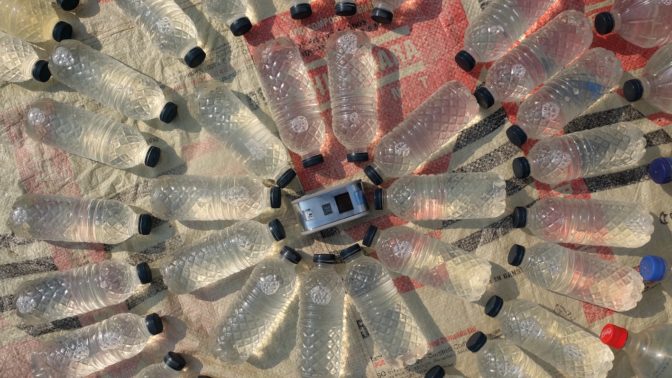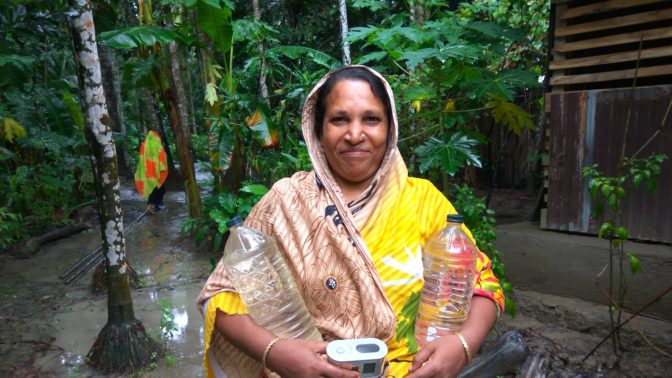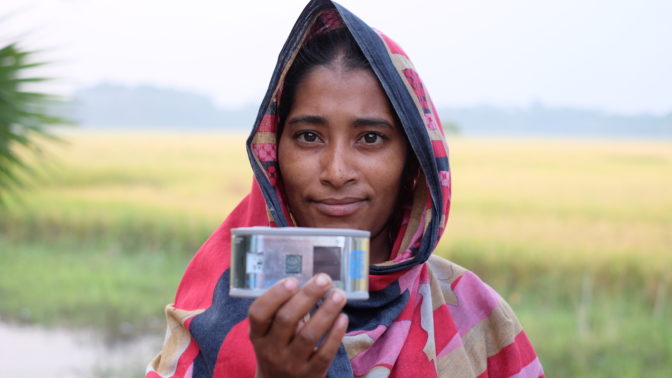HELIOZ’s WADI device does more than provide sanitary drinking water – it improves entire communities
Recently, we were in conversation with epNetwork member, HELIOZ, discussing their water sanitation device, WADI, and how they have managed to continue work throughout the COVID-19 pandemic. Additionally, we heard from one of HELIOZ’s partners in Bangladesh and learned, first-hand, from WADI users about how the device has impacted their lives. It was a pleasure to hear from HELIOZ and the community – enjoy the read!

Can you briefly explain what you do and how WADI works? How did you come up with the idea?
HELIOZ is a social enterprise that offers innovative solutions to improve access to safe drinking water in rural communities worldwide, preserving the environment by reducing carbon emissions. By replacing boiling of water using firewood with Solar Disinfection (SODIS) with WADI, HELIOZ is generating CO2 certificates for the voluntary carbon market, following Gold Standard certification.
WADI makes the use of SODIS more reliable and practicable. WADI is a solar powered UV-measurement device that is placed next to transparent bottles and serves as an indicator for SODIS. A happy smiley face on the WADI display indicates the point in time at which the UV-radiation of the sun has made contaminated water in bottles safe to drink.
As an impact of Covid-19 and my husband’s difficulties of pooling the van and earning money, we fell into extreme poverty and started to live in a crisis. One day my husband told me that he got an offer to supply safe water among 10 rich families after purifying it by WADI. They identified a specific pond for the collection of water and purifying water with WADI technology. Since my husband started this opportunity, he started to supply water in the evening after purifying it by WADI through putting additional bottles along with our regular bottles for consumption.
How has HELIOZ – an Austrian-based organization working in many countries, including Bangladesh – been able to continue its social impact efforts despite COVID-19 travel and social-distancing restrictions?
We stuck together and adapted. Work had to be managed from home. It took a while but, in the end, thanks to our IT infrastructure, we managed to communicate over the internet. The organizational issues could be solved – nationally and internationally – and our projects could be continued in a way that was new but still effective for our projects. Through internet access and video chats we were able to bring team members from all over the globe together to continue our work.
Early on, we discussed the challenges that we were likely to face in current and future projects whilst respecting and safely implementing COVID-19 guidelines. Using data-based and remote monitoring during times with restricted travel and working with communities to mitigate the spread of the virus. The close exchange with our international implementation partners has made it possible to set up an agile project management approach. In cooperation with long-term business customers, we also strengthened the project activities through additional COVID-19 prevention measures and awareness campaigns.

HELIOZ was part of the Cents4Sense program by Siemens AG. The initiative enables Siemens employees around the world to donate the dividend from a single Siemens share. The donations are then used to support international projects run by Siemens Stiftung. How has funding from Siemens AG’s Cents4Sense program been able to continue supporting Bangladeshi people in accessing sanitary drinking water?
Cents4Sense supported people in the Bagerhat district of Bangladesh by supplying over 2,000 additional households with clean drinking water. More than 10,000 people benefit from the sustainable SODIS method with WADI to produce clean water. It continued the work of an existing HELIOZ project and therefore makes it possible to support even more people in the region.
WADI is a water treatment solution that provides people with approximately 15.3 million liters of disinfected water per year. Has COVID-19 benefitted your work in any way, knowing hygiene and sanitation have become top of mind for people around the world?
In some ways it definitely has. People all around the world became even more aware of the importance of sanitation and hygiene. Throughout our projects we do not only show people how to use the WADI device, we also train them on know-how about sanitation and hygiene. We inform them about the importance of safe water usage to help minimize the spread of bacteria and diseases.

Since we did not have any ability to boil water, we were only dependent on fitkiri, a special chemical, for purifying river water. It was not enough to disinfect the whole river and we were not sure whether the water is disinfected or not. Due to these situations, my children and husband suffered from abdominal problems. Now we are happy we have WADI and use it almost every day. No water borne diseases appeared recently in the life of my children, my husband and me too.
More from HELIOZ partner, Md. Moinul Islam, Coordinator, Centre for Disability in Development (CDD).
Can you provide some real-world examples that help illustrate how HELIOZ’s WADI water treatment solution has had an increased impact on local residents?
WADI users never forget to put PET bottles with WADI devices in the sunlight – they do it on a daily basis. Every day it is the first thing on the agenda and the responsibility of the mother or father because it is practically proven and believed that WADI ensures the healthy life of family members. Now each household feels that WADI is part of their life.
Due to health and wellbeing now WADI user-families have enough time to be involved in work and earning income. Children are less absent, attending school more often. The main impact is, that users are able to save money from firewood costs and the treatment of waterborne diseases. Local hospitals normally are packed with patients that suffer from waterborne diseases, however, it showed that WADI users did not have similar problems this year. Additionally, children are motivating school authorities to use WADI at the school level, so that the students are able to lead a healthier life and are given access to safe water on school grounds. Children also bring WADI water to school and share it with other friends. During the rainy season, WADI users are happy to use rainwater, after collecting the water they apply WADI water treatment in order to disinfect.
People with disabilities are also interested in using WADI because of its easy access. Due to their disability or their functional limitations it’s important not to create any problems for them. Sharing a WADI is very popular on community levels for good health and wellbeing for everyone. Fishermen go to the river for fishing and collect any PET bottles floating in the river, because they have WADIs in their house and can reuse the bottle.

I have seen the performance of WADI in my near villages and wanted to try it out myself. Finally, the opportunity arose, and I received a WADI. Now, I am very happy to have the device and I follow a schedule. On my way to work, I place the WADI in the streets and surround it with PET bottles filled with pond water. When I return from work in the evening, I see the surrounding bottles of water being disinfected. WADI has reduced my hard work travelling to distant places and now I can supply water to clients and earn money.
From your perspective, what benefits does WADI have that other water sanitation products don’t?
Everybody can use WADI. It is reliable, well-functioning, and lasts long. There is no need for any chemicals that are meant to clean the rivers and waters as well as no need to charge the device.
From a user’s perspective, how do you see WADI’s impact benefitting people in years to come?
I see it being used on family compounds and nearby forests. We will see some green again, close to our village, as nobody collects firewood anymore since they have had a WADI. Villages will be less threatened by waterborne diseases and the community will enjoy healthier lives. People have started to call villages by the name “WADI village”. And community people even call the community facilitator by “WADI Apa” – Apa means sister. That means the people have gained even more recognition among their neighbors, family, and friends.
More people with disabilities will be able to provide safe water and use WADI devices with their families. Educational buildings and institutions will use WADI as well because students are becoming WADI ambassadors.